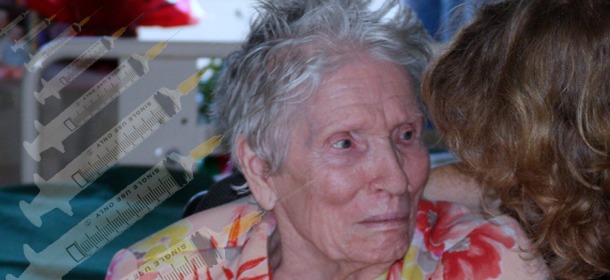Featured
How Psychiatry Holds onto Its Victims: Creation of a No-Win Situation
As seen in the first part of Jody’s story, it’s easy to fall into the psychiatric system. Asking for help is all it takes. Once in it, the chances of coming out whole are almost nonexistent.
Part 1: Psychiatric Incarceration: It Can Happen to Anyone.
The Trap
Now, the story gets worse. Jody has been labeled with a mental disease, one that the labelers claim is permanent and requires taking exceptionally toxic drugs for the rest of her life. Therefore, they have laid claim to her. They have decided that they can grab and hold her virtually any time they choose.
If Jody takes the drugs they’ve prescribed, they make her extremely ill. If she doesn’t, the mental system says that she isn’t compliant with her treatment, and they can take her at any time on that basis. No help has been provided to deal with the horrible symptoms, and no help has been provided to deal with the symptoms of withdrawal. The result has been two more rounds of psychiatric incarceration since this entire travesty began less than a year ago.
When she was taken the second time, she was held for two months. That, of course, required that she be taken before a judge to authorize incarceration for more than 10 days. Shortly before, she was injected with Haldol, a powerful antipsychotic. As a result, she was barely able to talk. You can imagine the sort of impression she made at the hearing. The social worker is supposed to be her advocate, but that person was buddies with the psychiatrist.
Her family’s attitude was molded by the National Alliance on Mental Illness (NAMI), an organization that styles itself as being for patients, but in reality takes the bulk of its money from Big Pharma. They’ve offered Jody no help, but they’ve provided her family with ammunition to continuously place her in no-win situations.
If she says something they don’t like, then she’s told she’s wrong because of her “illness”. They refuse to hear her when she tells them of the drugs’ adverse effects. NAMI has been advising them on how to deal with their “sick” relative, but everything they suggest is clearly designed to assure that she’s consistently treated in a demeaning manner. Her own views of what has happened are given no credence. The only state in which she’s acceptable to her family is zoned out on drugs.
So it isn’t surprising that Jody was dragged off to a psych hospital a third time because she didn’t want to take the drugs. This was a public humiliation. The police arrived and treated her like a criminal, even frisking her in the front yard, in sight of the neighbors. In listening to Jody tell her tale, her feelings of shame and disgrace from that incident alone are clearly still unbearable.
Forced and Overdose Drugging
Jody says that the drugs made her arms ache, like they were in a metal vice. She couldn’t move. The sweat poured off her, soaking her clothes and bedding. Her teeth chattered. She felt like she was dying. She fell hard and hit her head. The next day, a nurse laughed at her “shiner” and told her to let them know if she couldn’t get up. But there was no way to tell them, which had to be obvious. She was even accused of faking when she couldn’t walk.
When she complained, that was used as yet more reason to drug her. They called it perseverating and added it to her charts to justify what they were doing. It didn’t matter what she was complaining about. Her heart rate skyrocketing? She was just being a nuisance. In pain? She must be faking. Panic attacks from it all? Get over it! Get with the program! 
The physical symptoms made Jody fearful for her life. Naturally, she was agitated and complained. The psychiatrist chose to attribute her agitation to her nonexistent disease. So, the worse her physical trauma, the more the doses were increased. Her Zyprexa dose was increased to 30 milligrams, half again as much as the maximum allowable!
Should you doubt this, a copy of one of the order sheets is shown.
Jody was told that she simply didn’t understand how sick she was—and that, of course, was yet another “proof” that she was sick.
Making her compliant was the only thing that anyone cared about. Apparently, it didn’t even matter if they drugged her to death.
Jody was kept in a state of either drug-induced agitation or drug-induced torpor. Her anxiety was caused by the physical symptoms, but her complaints about them were ignored, other than to increase her dosage until she was in a state of apathy, numbness, and wasn’t able to complain. That’s what’s called treatment. She describes it like this:
Medication management. Refills. Medication changes. Medication increases. Medication adjustments. They never attempted to discern what was causing my issues such as rapid speech, not sleeping, loss of appetite, delusional thoughts, racing thoughts, and sometimes periods when I was depressed or anxious or moody.
How could anyone not be depressed in such a situation? If you were torn from your life, placed in a hostile situation, forcibly drugged, everything you say or do is used against you, left with nothing to do, and constantly treated in a demeaning manner, how do you think you’d respond?
Part 3: Psychiatry: Loss of Rights by Diagnosis
*Relatives and anyone else referenced are changed to disguise her. However, all the particulars are accurate. Do not believe that it can’t happen to you because you aren’t in America. I recall my shock in the UK at being told by a woman I knew and had worked beside. She’d been forced onto medication. Her home had been taken from her to pay for the treatment—all against her wishes. She sobbed in front of me. Any hope she’d had was gone. Without her home, she had no place to go. Could anything more effectively destroy hope?
Please check the website of Mokarta Graphics, who did the wonderful image above.
Tagged big pharma, pharmaceutical drugs, pharmaceuticals, psychiatric drugs, psychiatric hospitals, psychiatric system, psychiatric trap, psychiatry
Related Posts
-
deborahobr
-
Celia Harrison
















